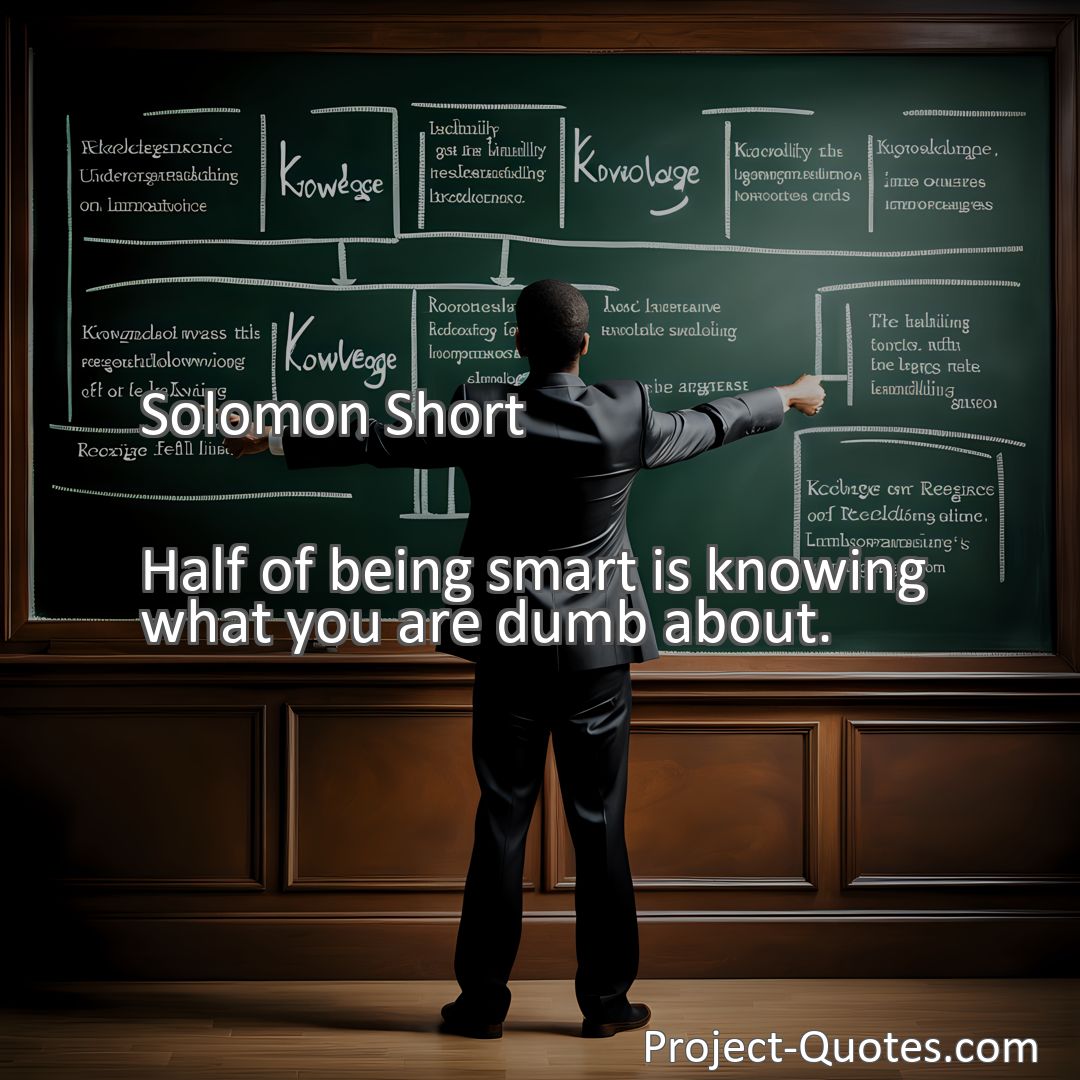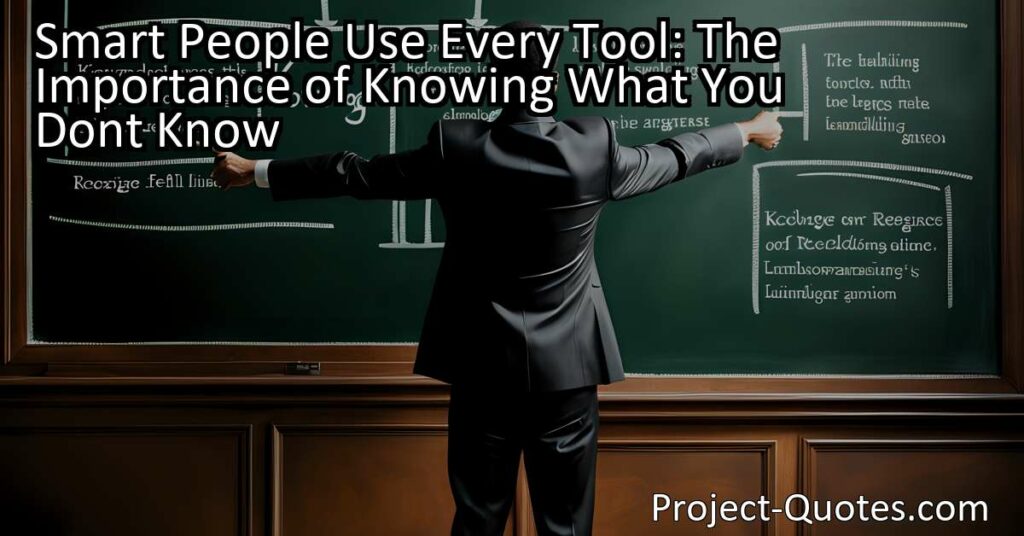Half of being smart is knowing what you are dumb about.
Solomon Short
Smart People Use Every Tool: The Importance of Knowing What You Don’t Know Smart people understand the importance of recognizing their limitations and knowing what they don’t know. This knowledge allows them to fill in the gaps in their understanding and seek help from others or use tools to expand their knowledge. Being smart means being brave, curious, and always ready to learn.
Table of Contents
Meaning of Quote – Half of being smart is knowing what you are dumb about.
Alright! Let’s chat about a really cool quote by someone named Solomon Short. He said, “Half of being smart is knowing what you are dumb about.” Now, that might sound a bit funny at first, but it’s actually a pretty wise thing to say. Let’s explore what it means and why it’s super important!
Imagine you’re standing in the middle of a giant library. There are books everywhere about dinosaurs, how rockets fly, stories about knights and dragons, and even books about why we dream. Its like a treasure chest of knowledge! You might know a lot about dinosaurs, but not so much about rockets. Here’s where the quote shines! Being smart isn’t just about knowing a bunch of stuff; it’s also about knowing what you don’t know.
So what exactly is Solomon Short trying to tell us? Well, he’s saying that smart people are aware of their limits. They realize that they can’t know everything and, most importantly, they’re not afraid to admit it. This is really important because if you think you know everything, you’ll never ask questions or learn new things. And asking questions is like opening doors to new worlds of knowledge.
Lets break it down a bit more. When you know what you’re “dumb” about, or let’s say, what you don’t understand yet, you’re in a great position to become smarter. How? Because you can start filling in those gaps. Its like knowing exactly which pieces are missing in a puzzle and then going on an adventure to find them.
Another cool thing about this quote is that it tells us that everyone has different strengths and weaknesses. You might be a wizard at math, but your friend could be a legend in history. Thats totally okay! Knowing our weaknesses means we can team up with friends who understand the stuff we don’t. Together, we build a team of brainpower that’s ready to tackle anything!
Understanding your not-so-great areas also means you won’t be too hard on yourself when you’re learning something new. Let’s say you’re trying to learn how to play the guitar, and it’s tough. If you start feeling down about it, remember Solomon Short’s words. It’s okay not to be a guitar hero right away. Being aware that you’re just starting out and need time to learn is a sign of smarts!
Being smart also means knowing how to find answers. Its like being a detective on the hunt for clues. If you know you’re not great at spelling, there are tools like dictionaries and spell checker that can come to your rescue while you’re learning. Smart people use every tool and friend available to help fill in the blanks.
Now, you might be thinking, “But doesn’t admitting that I don’t know something make me look silly?” Not at all! Actually, when you ask for help or look for more information, it shows that you’re brave and curious, which are two superpowers of smart people. The smartest folks out there scientists, inventors, artists they all ask questions and never stop learning.
Also, knowing where you have more to learn can save you from making some pretty big mistakes. Imagine you’re about to jump into a huge project, like building a treehouse. If you act like you know everything about building, you might end up with a wobbly treehouse that isn’t safe. But if you admit you don’t know much about carpentry, you might get a book, watch some videos, or ask someone with experience for help. That way, you’ll end up with a super cool treehouse that’s sturdy and awesome.
Here’s a fun fact: some of the smartest people in history realized they didn’t have all the answers. They were always learning, discovering, and admitting when they didn’t know something. They asked questions, made mistakes, and tried again.
So, to be smart, you’ve got to be a bit like a sponge always ready to soak up new knowledge and understanding that there’s always more water in the ocean. Its okay not to get it right the first time. That just means theres more fun learning to do!
Its also about sharing what you know with others. Maybe youre great at explaining things in a fun way, or maybe youre a pro at coming up with examples that help your friends understand. When you do that, you’re spreading knowledge, and everyone becomes a bit smarter together.
Being smart is a lot like going on an adventure. You’ll find out new things about the world around you and about yourself. And speaking of adventures, think of all the cool experiences you’ll have by trying out new things, even the ones you’re not too sure about at first.
In the end, being smart means being comfortable with the fact that there’s a lot to learn, and that’s perfectly fine. Its like having a map where half is already filled out and the other half is just waiting for you to draw in. Knowing what you dont know is an invitation to explore, to discover, and to grow.
So, keep Solomon Shorts wise words in your pocket as you go through school and life: “Half of being smart is knowing what you are dumb about.” Its a reminder that there’s always something new to learn and that each of us has a unique brain thats geared for endless learning and fun.
There you have it! Keep asking questions, be proud of what you know, and always stay excited about finding the missing puzzle pieces. That, my friend, is a big part of being truly smart.
I hope this quote inspired image brings you hope and peace. Share it with someone who needs it today!


